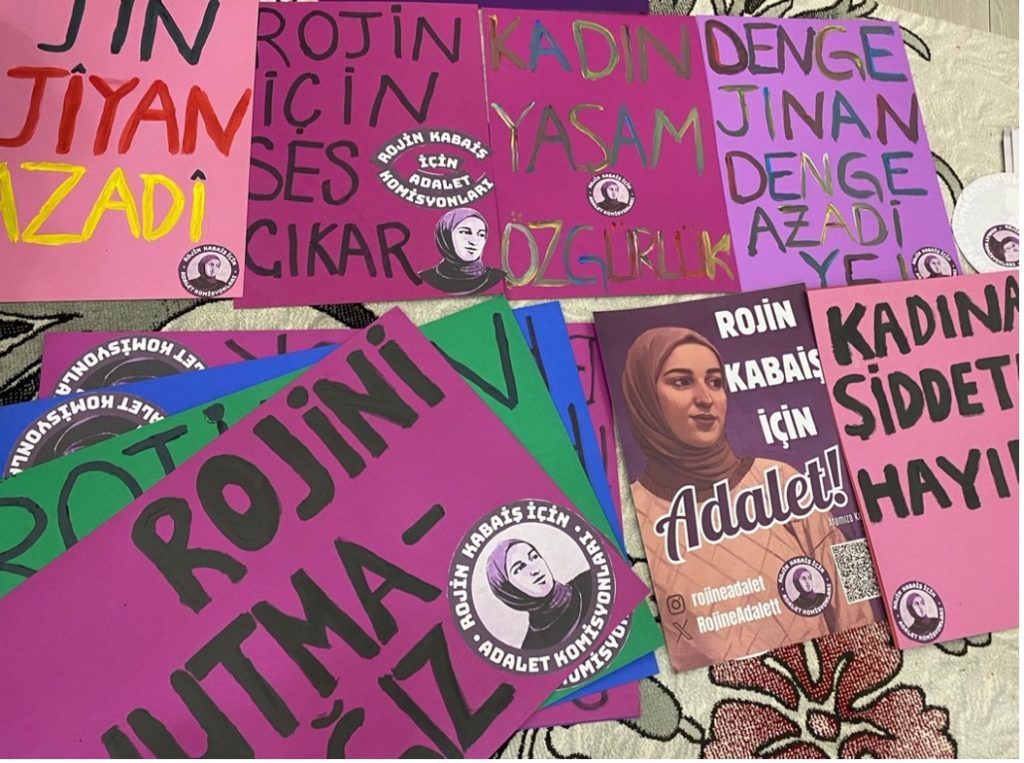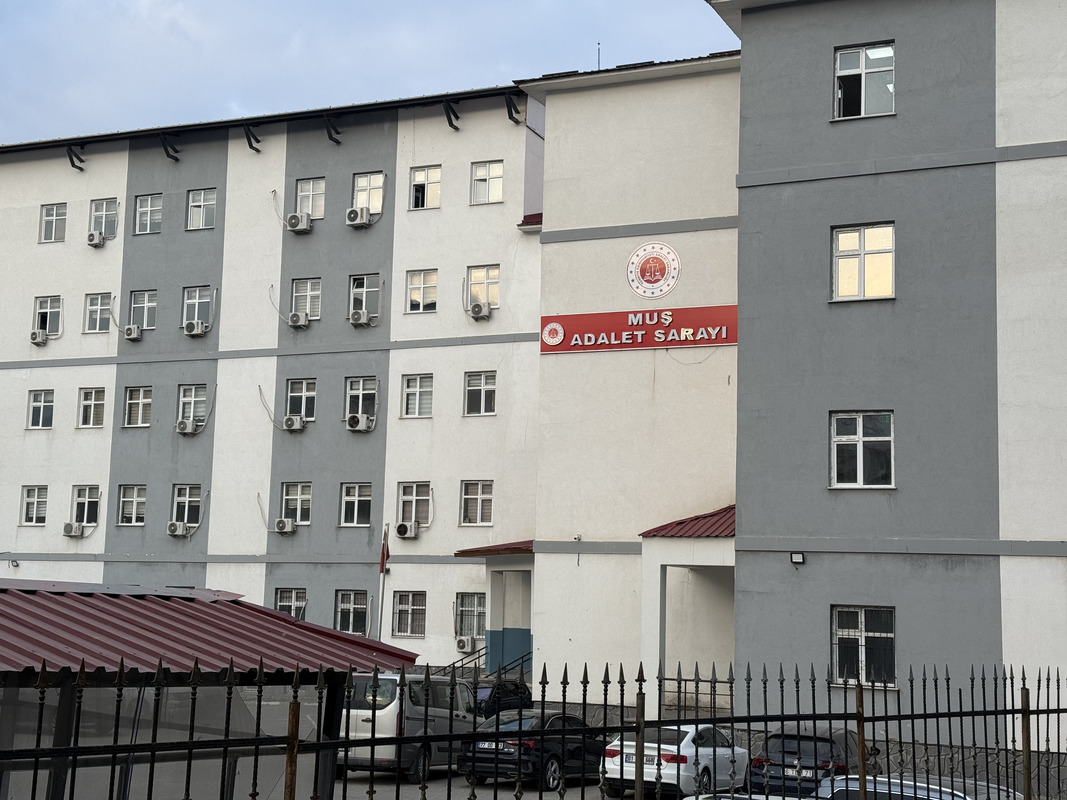Latest Name on Turkey’s Growing List of “Suspicious Female Deaths”: Rojin Kabaiş
Walls in Wan (Van), Turkey, days before November 25 International Day for the Elimination of Violence Against Women: “What happened to Rojin?” (Kurdish, left; Turkish, right)
Rojin Kabaiş went missing on September 27, 2024. They found her body almost three weeks later, along the shores of Lake Wan (Van), on October 15, 2024. State institutions said her death was a suicide, but her autopsy report showed signs of rape and murder, leading to suspicions of a cover-up.
The death of Rojin Kabaiş, a student at Van Yüzüncü Yıl University (YYÜ) in Wan, has become one of the most closely followed and contentious cases in Turkey, set against the backdrop of ongoing femicides and suspicious female deaths, with more than two hundred murdered women in 2025 alone.
Throughout 2024 and 2025, protests were held, parliamentary statements were made, allegations about the rector’s presence at the autopsy were debated, and new parliamentary inquiries were submitted, only to be blocked by the governing coalition’s no votes.
As the investigation continues, two points have drawn scrutiny:
The first is the allegation that her university’s rector attended her autopsy. While the second is the claim that the forensic DNA report was deliberately delayed, in October and November 2024, the Forensic Medicine Institute (ATK) identified DNA from two different men on Rojin’s body, but the report was not released on time; it only came months later.
Both her family and women’s rights groups see these issues as serious potential procedural violations.
Throughout 2024 and 2025, protests were held, parliamentary statements were made, allegations about the rector’s presence at the autopsy were debated, and new parliamentary inquiries were submitted, only to be blocked by the governing coalition’s no votes.
In November 2025, Kabaiş’s family returned to parliament to declare “This is a murder,” reiterating their demand for justice.
Two Main Points of Contention
The most prominent controversy centers on allegations that YYÜ Rector Prof. Dr. Hamdullah Şevli was present in the ATK’s autopsy room. The family questions why a university administrator, without autopsy authority, was there, suggesting it could represent the use of institutional influence.
Rector Şevli denied the allegations, calling them “slander,” and stated that the process was fully recorded. Posts and discussions in this vein, including users on X directing questions to Grok, have been blocked in Turkey, further fueling suspicions of a cover-up.
This is also not helped by the fact that at Rector Hamdullah Şevli’s request, Van 2nd Criminal Court of Peace removed 540 pieces of content and blocked 86 accounts. The Dicle Fırat Journalists Association criticized the censorship in a post stating, “What is the Rector of YYÜ Hiding?”

Another point of contention is the delayed release of the autopsy report on the two different male DNA samples found on Rojin’s body. Her family and legal representatives view the late disclosure as a transparency issue that slows down the investigation.
When the findings were finally shared, samples taken from Kabaiş’s chest and genital area were confirmed to contain DNA from two different men. Contamination was ruled out, establishing that the traces were directly related to the case and reinforcing the possibility of sexual assault.
The report also detected the presence of Rocuronium, a muscle relaxant. While the forensic report states that the amount found was not sufficient to render her unconscious, the presence of the drug raises suspicions that the victim may have been physically incapacitated prior to her death.
An Illustrative Case of Rising Suspicious Female Deaths
Women’s rights organizations report that in the first ten months of 2025, at least 235—317 women were murdered, while the number of suspicious female deaths reached 247.
The protection gap created by Turkey’s unilateral withdrawal from the Istanbul Convention in 2021 – which served to protect women and women’s rights – combined with a perception of impunity, ineffective preventive mechanisms, distrust in official institutions, and rapidly increasing private gun ownership, has emboldened perpetrators and created a grim reality in which women’s murders are often classified as “suicide,” “accidents” or “unsolved.”
Women’s rights organizations report that in the first ten months of 2025, at least 235—317 women were murdered, while the number of suspicious female deaths reached 247. Experts and activists emphasize that abandoning the Istanbul Convention has eliminated its deterrent effect on violence, and shortcomings in the enforcement of Law No. 6284 – for the protection of women, children, and family members from violence – have further reinforced the perception of impunity.
Women’s groups argue that with the abandonment of the Istanbul Convention, the state has withdrawn from its obligation to protect women.
Beyond Negligence: Are Institutions Becoming Complicit?
Rojin Kabaiş’s death has gone from suspicion of an individual murder to a case marked by allegations of systematic negligence – and even cover-up – by state institutions: The incident occurred within campus boundaries, meaning that the administration of YYÜ, its security unit, and the dormitory administration are seen as culpable from the outset.
Beyond the first allegation against Rector Hamdullah Şevli, regarding alleged intervention and influence in the autopsy, a more serious claim, reported by JinNews, alleges that Rojin was raped by a security officer who was employed at the university with Rector Şevli’s approval, and that the officer fled abroad a week after Rojin went missing.
Following these reports, Van Chief Public Prosecutor’s Office launched an investigation into JinNews Editor-in-Chief Öznur Değer and reporter Dilan Babat in relation to their coverage of the Rojin Kabaiş case.
The Forensic Medicine Institute (ATK) has also been heavily criticized for taking more than 45 days to issue its report. The family has argued that the report was deliberately left ambiguous in order to obscure the possibility of murder. And the prosecutor’s office is likewise accused of conducting a “slow and incomplete investigation”.
It was also alleged that while Rojin’s body was being transported to the ATK, Van Governor Ozan Balcı approached her father, Nizamettin Kabaiş, inside the ambulance and told him: “Look, your daughter was found in the water [Lake Wan]. That means she committed suicide. You will accept this, Mr. Nizamettin.” The family has said the governor exerted psychological pressure on a father who had not yet even buried his daughter.
In its statement on November 18, the Van Bar Association’s Women’s Rights Center accused state institutions of deliberately obfuscating a potential murder case and attempting to close the file as a “suicide.”
The Center also pointed to inconsistencies in the autopsy tubes and suggested that the initial report may have been prepared in a way that concealed evidence of homicide. They noted that the CD containing the autopsy footage provided to the family was damaged. Adding that officials’ dismissive response that “the original is still at the Forensic Medicine Institute, there is no problem” further deepened suspicions of evidence tampering.
The Family and Rights Groups Ask: How Did Rojin Really Die?
Women’s organizations, Rojin’s friends and the Kabaiş family agree on one point: this case cannot be left in the dark.
The gaps in the reports, the delays, contradictions regarding the roles of officials, and the direction of the investigation point to, not only unanswered questions about Rojin’s death, but also to a broader justice deficit in Turkey’s unsolved femicide problem.
The Rojin Kabaiş case has refocused public attention on rising violence, inadequate protection mechanisms, systemic impunity, and the question of institutional responsibility in Turkey.

Women in the country have repeatedly reclaimed Taksim Square – a symbolic site of resistance, blocked to the opposition under Erdoğan’s rule – by breaking through police barricades every March 8 and November 25, gathering there in the tens of thousands. This year, on the International Day for the Elimination of Violence Against Women, women’s organizations invoked Rojin’s name in their calls for the November 25 demonstrations, saying:
“We will be at Taksim Tunnel at 7:30 p.m. on November 25 to demand that those responsible for Rojin Kabaiş’s death be found and that her suspicious death be fully uncovered. Join us and help amplify Rojin’s voice.”
Serap Gunes
Serap Güneş is a freelance translator and writer based in Istanbul. She holds a PhD in International Relations and European Politics from Masaryk University, where her research focused on minority rights and EU–Turkey relations. Her work has appeared in both academic journals and independent media outlets.




